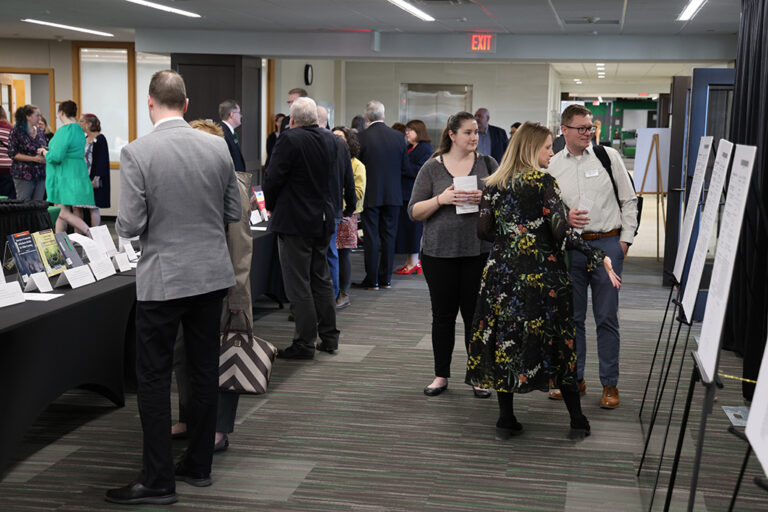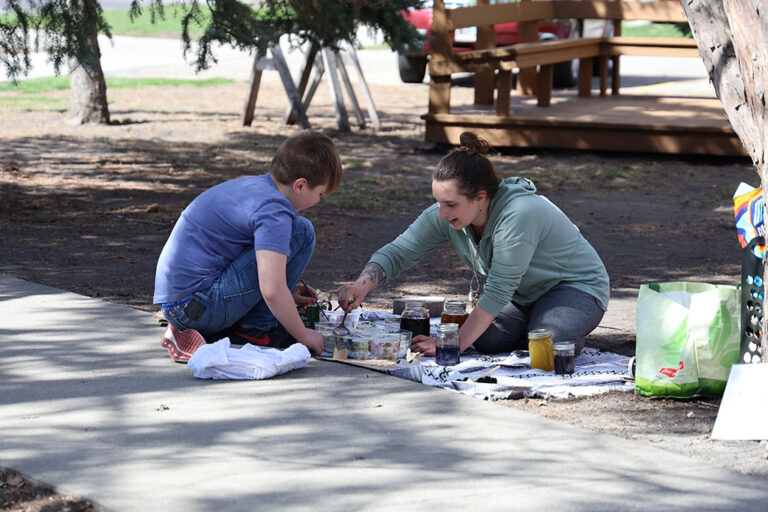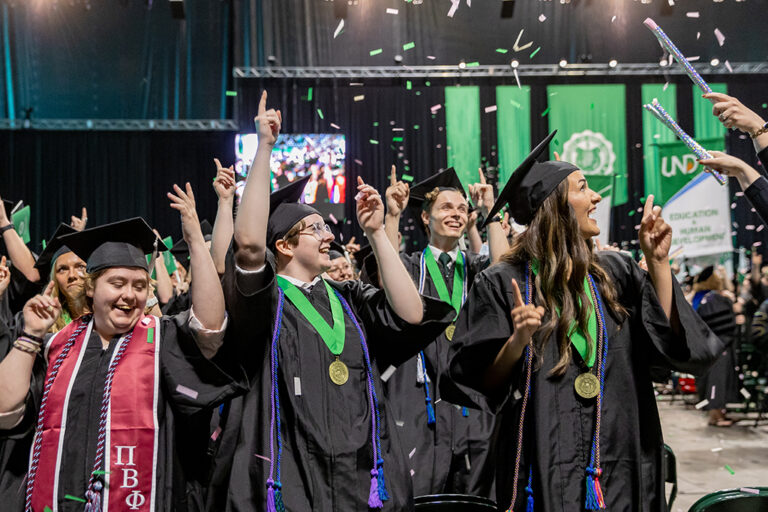The (grad) student becomes the teacher
UND hosts first campuswide teaching workshop for graduate students

It’s not hard to imagine the stress first-time instructors encounter when they enter the classroom. Each class is unique and can have different dynamics, not to mention students with varied needs. It’s a challenging road to navigate, even for seasoned instructors.
Graduate teaching assistants must grapple with these difficulties in addition to maintaining a tough schedule of classes, coursework, and exams. Often, they are looking to gain experience in teaching while deferring some of the cost of schooling, but do not yet have experience leading a classroom.
At UND, the introduction to college teaching for GTAs is varied. Some departments, like mathematics, offer a robust introductory programs for their students ahead of the first day of class. In contrast, other departments may lack the resources or time to offer their GTAs a comprehensive framework for teaching.
To address this inconsistency, Chris Nelson, dean of Graduate Studies, conceived the idea of a Graduate Teaching Assistants’ Best Practices for College Teaching program, open to GTAs both experienced and new.
The program — the first of its kind at UND — was held Aug. 16. Intended to introduce core concepts of collegiate instruction to GTAs, the event saw instructors cover topics such as “Classroom management” and “Building positive relationships with students” over the course of the eight-hour day.
Nelson said he came up with the concept during his early tenure as dean.
“Last fall, I started a tour of the graduate programs around campus,” he said. “I was talking to the students and faculty of each program to try and get a sense of what they needed, and one of the most common answers was that there wasn’t enough introductory preparation for GTAs.”
As he organized the event, Nelson drew from his own experience in assuming the role of a teacher with little framework for leading a class.
“The first year I taught a course, I had just come out of my undergraduate program, and I didn’t have any training,” he said. “I was terrified. And thinking back to times like that, you don’t want others to have that experience.”
In collaboration with UND’s Teaching Transformation and Development Academy (TTaDA), the School of Graduate Studies organized interactive discussions on case studies and four in-depth workshops led by TTaDA staff.
According to Nelson, TTaDA’s director of faculty development, Anne Kelsch, and executive director, Lynette Krenelka, were instrumental in putting the event together.
“We didn’t have the resources to put all of this together on our own, and they were more than happy to help us out,” Nelson said. “This was right up their alley, and they put together all the content and led the students through it. I think we worked really well together.”

Kelsch said TTaDA designed the workshops to address the immediate needs of GTAs and help them develop a healthy relationship with teaching, which can be a struggle for inexperienced instructors.
“Most of us have spent a lot of our lives in school, and I think our instinct is to emulate what we’ve experienced as students, which isn’t always right,” Kelsch said. “Teaching is most effective when it’s authentic to who you are.”
“We wanted to introduce these students to methodologies that they can use to be an excellent teacher, whether they struggle with standing in front of huge groups of students or not.”
Beginning the day with case studies, GTAs worked together through challenging scenarios they might encounter, such as addressing plagiarism incidents or parental concerns over their student’s mental health.
Dean of Students Alex Pokornowski, Special Assistant to the President for Diversity & Inclusion Tamba-Kuii Bailey, and Kelsch facilitated discussions on different scenarios while providing insight and answering questions.
The exercise introduced the GTAs to potential classroom dilemmas while offering an overview of the kinds of support available to them. According to Nelson, this was one of the most important goals of the day.
“I was a graduate student and instructor at a large university, and I had no idea what resources were available to me,” said Nelson.
“There are a lot of resources on our campus, and sometimes there’s the impression that those resources are available only to faculty. Part of what makes these workshops valuable is that we’re introducing them to things like TTaDA and Alex, our dean of students, so they know where to turn to when these situations come up.”
To this point, the leaders of each workshop made an effort to extend invitations for all GTAs to reach out should they have any questions during the semester, thus assuring the GTAs that they have support at the TTaDA office.

In her Effective Methods of Delivering Constructive Student Feedback workshop, Kelsch said that thoughtful feedback can be instrumental in undergraduates’ success.
“You’re oftentimes closer to them in terms of their understanding of things, and that makes you very relatable to them,” she told the graduate students. “That makes you a really important part of bridging the gap between students and their material. Great communication can really help them thrive and grow.”
A diversity, equity, and inclusion workshop focused on the benefits of utilizing Blackboard Learn accessibility tools like screen readers and closed-caption programs. The instructors of this workshop, Anna Kinney and Bridget Brooks, emphasized that implementing these accessibility improvements helps education for all students.
“Inclusive classrooms benefit everyone,” Brooks said. “An example I like to use is curb cuts, which came from the disability rights movement. They’re not just used by people with limited mobility, everyone from bicyclists to people using strollers finds them helpful.
“When we make decisions to increase accessibility, we end up serving everyone.”
Like curb cuts, she said, practical tools like closed captions can be used by parents with sleeping children who need to watch a lecture quietly as well as students with hearing impairments. Lessons like this were a pervading theme for the day, and Kelsch said this was intentional.
“We really appreciated having the opportunity to let GTAs know that even small moves on their part can make a big difference to their classrooms,” Kelsch said. And, for their part, the graduate students seemed to be receptive to this sentiment.

Deborah Hershey, an atmospheric science student from Winona State University, says that entering her first year of teaching undergraduate students was a nerve-wracking prospect, but that the event helped to bolster her confidence.
“I feel like I’m much better equipped to handle whatever comes down the pipeline this year,” she said. “I’m new to UND, and I’m not familiar with Blackboard and its tools, so I learned a lot from those workshops. It was long, but it was a very, very good day.”
Nelson says the School of Graduate Studies plans to continue the Graduate Teaching Assistants’ Best Practices event in the future. For him, these workshops hold value beyond helping GTAs navigating unfamiliar roles; their benefits extend to the entire campus community.
“I think from a university-wide perspective, we want our students to be comfortable in the classroom. When our GTAs have the resources to succeed as instructors, our undergraduates get the benefit of having a good teacher early in their academic careers. This sets up everyone for success.”



